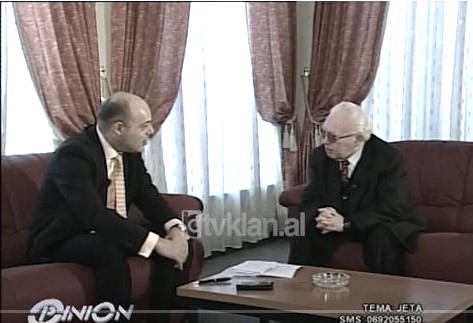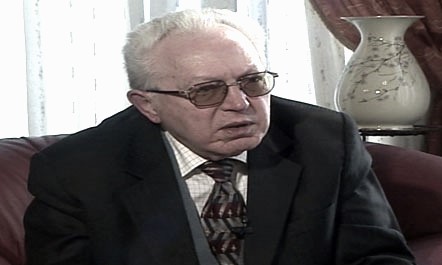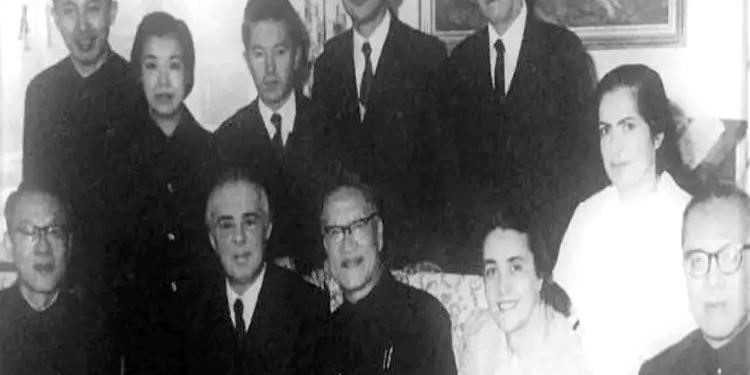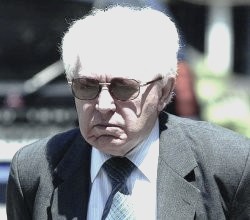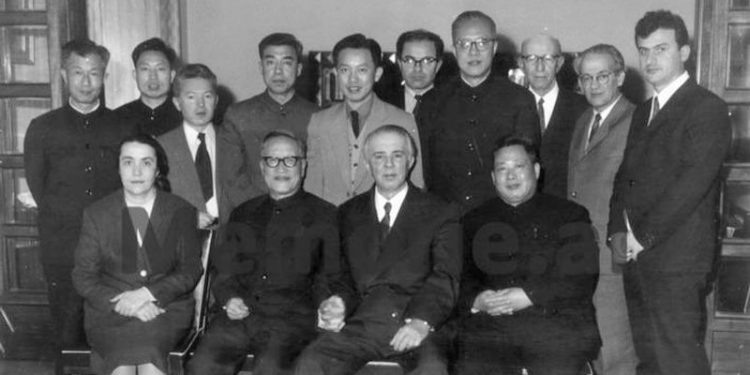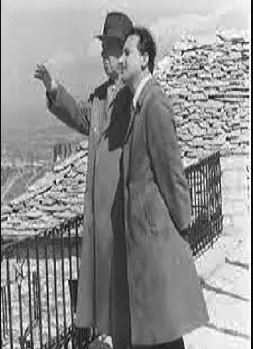By Blendi Fevziu
Part One
Memorie.al / The well-known doctor and academician, Prof. Dr. Ylli Popa, originating from a renowned family with intellectual traditions from the city of Elbasan, graduated in Medicine in Bucharest and Moscow in the late 1950s, a lecturer at the Faculty of Medicine in Tirana and founder of the Albanian School of Cardiology, former chairman of the Academy of Sciences of the Republic of Albania from 1997 to 2007, a former member of the People’s Assembly before the ’90s, decorated with various medals and orders, as well as the high title “Hero of Socialist Labor,” in 2007, gave a long account of his life and career as a doctor and academic to the journalist Blendi Fevziu on the “Opinion” show on Tv Klan. In his testimony, Prof. Popa focused extensively on telling how he became Enver Hoxha’s doctor, how the dictator was medically treated, the meeting with Nexhmije and Ramiz on the last night Enver Hoxha died, and how the news was announced, etc. For more on this, we present his interview, which we are publishing in several issues.
Mr. Popa, in which year did you graduate from medicine?
In 1954.
Why did you choose medicine? Was there a close connection between you and this profession?
Yes, there was a very close connection.
Which was…?
Because I am from an Elbasan family, where in my close circle, even very close, I had five doctors.
Five doctors in Albania in the 1950s?!
Yes.
Before the 1950s?
Yes, before ’50, because I started the faculty in 1948 and finished in 1954; medicine was six years long at that time, in Romania, Bucharest.
How did you have five doctors in your family?
My maternal grandfather’s brother was a doctor. His name was Filip Papajani. He was one of the doctors in Pogradec, at least that’s how I remember him, settled in Pogradec. He had gone from Elbasan to Pogradec, he had moved there. Filip Papajani was a doctor, perhaps the first doctor in Pogradec for that time.
He also wrote, he was also a writer, a poet, with the pseudonym “Lipi.” His books from that time are what he wrote. Then I had my father’s brother, a doctor, he was a military doctor, he was a Major even during Zog’s time, Petraq Popa. Then I had another doctor, Simon Popa, he was the father of Kol Popa, who was previously the Vice President of the Academy of Sciences.
Then I had another doctor, Stilian Nosi, from the well-known Nosi family of Elbasan, who was a doctor and was much loved, preferred by the people, very kind-hearted, he wanted to help people. Then I had Kol Popa’s brother, who was a doctor in New York. One of the first anesthesiologists in America. He finished the faculty during the Italo-Greek war, finished it in Bologna, and never came back to Albania, but went straight to America and settled there.
So, you had five doctors in your family, and you followed what could be called a family path…?
Yes, more or less.
Did you choose medicine yourself?
Yes, in fact, when I applied for a scholarship at that time, three fields were required for selection. I put all three for medicine. Medicine, medicine, and medicine. And I won medicine.
Fate brought you to be a medical student?
There is another phenomenon, it’s funny. We in Elbasan, it was a custom, I don’t know if it still is today or not, that young children, on the day they turn one year old, are placed in a circle, on a large white sheet, where the child is placed in the center and various objects of different professions are placed around him, a hammer, a notebook, a pen. Since one of my uncles was a doctor, someone put a stethoscope there. I, the child, am left in the middle, and people are all around, watching what the child will grab at that moment.
And you grabbed the stethoscope?
I had grabbed the stethoscope, they told me. Since I was a child, when I don’t remember, they called me the little doctor, and psychologically, I was prepared for medicine.
Professor, did you finish high school in Elbasan?
Yes, in Elbasan.
And from high school in Elbasan, you went to Bucharest, didn’t you?
Yes, I went to Bucharest.
What was the difference between Albania and Romania at that time?
There was a big difference.
In what sense?
In the sense that Elbasan at that time had 14 thousand inhabitants, while now it has grown several times more. Secondly, during the time of Zog, there was great poverty, so this was felt. But, on the other hand, there was great correctness from the people; poverty was faced with dignity. Families – I had friends at school there whom I knew were very poor, and they came patched up, but they were clean, so to speak. They were taught by the family, by the mother and father, the way to behave, with correctness. And the teachers at that time were very dedicated.
What was the difference with Romania?
Romania was quite developed. Bucharest at that time was called Little Paris.
Was it difficult for a boy coming from Elbasan with 14,000 inhabitants to navigate a big city like Bucharest?
No, it was not very difficult.
Why?
Because curiosity made you walk around, look, and register things. At the time I went to Romania, I knew Italian. From a young age, I had practiced Italian and knew it well. Romanian is a Neo-Latin language, very similar, very close, and to tell you the truth, I don’t even remember how long it took me to learn the Romanian language. So, I grasped those quickly. Then, the communication with Romanian friends at the faculty was more or less the same psychology as ours.
Did you return to Albania in 1954?
Yes.
What was the level of medicine when you returned from Romania?
Of course, compared to today, it was much further behind. Even today it may be far behind other, much more developed countries. Behind in terms of equipment, but the knowledge of the doctors is more advanced than it was in those years.
In 1954, what was the situation like? How many doctors did Albania have at that time?
I don’t know, to tell you the truth. In the hospitals, I was in the central hospital, or rather, as soon as I arrived here, the Minister of Health at that time, Medar Shtylla, called me and informed me that I would be appointed to the Faculty of Medicine to teach biochemistry. Biological chemistry. I loved chemistry very much at that time.
Especially biological chemistry suited me very well, according to my taste, because it clarified many mechanisms, many things, about medical illnesses. There were many mechanisms that, if you knew biochemistry, you understood better. That’s why I dedicated myself to it. However, I told him that I had finished medicine, but he told me that he wanted me to do it.
How did you specialize in cardiology?
After 4 years, from 1958 to 1962, in Moscow.
So, you completed what could be called the framework of the Eastern Bloc countries, Romania and Moscow; you spent 10 years of your life, didn’t you?
Yes, yes.
Where did you specialize in Moscow?
It is interesting because I specialized in a clinic called “Pyataia Sovetskaya Bolnitsa,” which means “Fifth Soviet Hospital” in Albanian, where the professor was a very well-known person there, Lukomsky, who was of Polish origin. And they said he was from a prominent Polish family; besides that, he had been on the team of Stalin’s doctors.
On the team that was executed, or on the other team?
No, he was not executed, because he came after the discovery of the doctors’ plot at that time. Another group of doctors came, but I don’t know if that is true or not, because it is very mysterious. But this Lukomsky was a man of authority and a man who lived alone, dedicated to medicine. But I also tried to probe, to understand other things through him. In fact, once I asked him: why does Stalin keep one hand on his chest, on the left arm, I had seen it in photographs and films of the time.
He explained to me that Stalin suffered from arterial hypertension, a hypertonic disease. Hypertension at that time did not have a cure; it had medicines which, when I came here, I also found those medicines, which are not used at all today. According to him, Stalin suffered small cerebral hemorrhages as a result of hypertension, and these caused changes in his character, changes that consisted of increasing his distrust of people close to him.
So, his distrust had a health explanation?
Yes, and also his isolation; it became very dangerous, meaning, wilder, it was not without consequences for the people at that time.
Professor, what were the differences between the Soviet Union and Romania; you knew both countries at that time…?
Romania at that time was a country very connected to the West, especially with France. I had professors who would go and teach, even at that time in Paris, who taught there and were known, and the books they had published were from French publishing houses.
While the Soviet Union was more isolated?
It was more isolated, at least on their part; then the Soviet Union at that time – these people said they had seized land from Romania – there was great enmity. Even though when the communist regime of that time came, there was great propaganda to bring them closer, to smooth out the disagreements.
In which year where you assigned to the group dealing with Enver Hoxha’s medical treatment, and how did this happen?
This happened gradually, because before that, I had carried out some requests from Enver. For example, Professor Fejzi Hoxha, who was a doctor from Gjirokastra, very good and professional, and it seems to me that he had an earlier friendship with Enver Hoxha since they were almost the same age, more or less. They told me that we had to go to Korça to visit Professor Konda.
Professor Konda was a professor who dealt with Albanology and especially worked on our Pelasgian origin; he had gathered arguments in this regard and had published them in a book that had made a name for itself. For these reasons, it was up to Enver to be concerned about his health. As such, Enver wanted to show concern towards him.
Did Enver Hoxha send you directly to visit him?
Yes. Not directly, but he sent word, so to speak. What was more interesting was that Enver still had his mother alive, there at home, at that time. She was elderly, she had some health problems, and one day, the doctors treating her told me that a consultation would be held for comrade Enver’s mother. I went there too and found out that she was sick, I examined her, and I told them: is there anything special here, because the diagnosis here seems simple to me. This was after I had returned from the Soviet Union, as a cardiologist.
What had happened?
Within the framework of her heart disease, she had also developed an accumulation of fluid, water in the pleura, – said the radiologist who had taken her to the Military Hospital for examination. In fact, not the radiologist, but an assistant who developed the films. He sent a letter to Kadri Hazbiu and made a kind of denunciation that the doctors were not treating Enver Hoxha’s mother well, and because he suspected it might be tuberculous, as it sometimes happened that the accumulation of water was of tuberculous origin, whereas for me, it was cardiac.
And for the other doctors treating her, it was from her cardiac side. But this denunciation proceeded, and they called me to clarify the diagnosis. I did not know this, because later they told me how the situation was. I realized then that it was from the heart, as the signs were there: pulse, heart rate, enlarged liver, shortness of breath, and so on. And I told them that this is a diagnosis for medical students in their senior years.
And from that moment, were you assigned to Enver Hoxha’s group?
No, that passed. Then after this, in 1973, Enver had a cardiac crisis, because he had suffered from diabetes for years, perhaps since 1948. However, diabetes is known as a disease that affects blood vessels wherever they are—in the heart, in the brain, in the kidneys, in the aorta, and so on. Besides that, he smoked heavily; he also had body overweight. For us, doctors, these are three conditions that predispose to heart diseases.
In which month did Enver Hoxha suffer the attack?
At the time I went. They called me to the special clinic, and there, Enver’s case was presented to me by Nexhmije Hoxha, Enver’s wife. It impressed me at that time that when Nexhmija spoke and addressed Enver, she addressed him as Comrade Enver. For me, it was abnormal for the wife to address him like that, as if she were an employee in that family! In fact, I spent about 12 years there.
You stayed with Enver Hoxha for 12 years?
Yes, and Nexhmija was always very careful, like an employee in the house.
Is it true that the person who really led Enver Hoxha was Nexhmija?
No. She helped him. For example, due to diabetes, Enver had eye problems, reading problems, and someone had to read the letters that came from foreign embassies or others to him.
How dangerous was the attack Enver Hoxha suffered in 1973?
Myocardial infarction is always dangerous at the beginning. Besides that, Enver’s illness dragged on for a bit. He was placed in Villa number 4, by the lake, currently the governmental residence. The Republican Guard was also there. He was stuck there because the new house was being built here in the meantime, and he had nowhere to return. We continued to stay there, the entire medical team.
How many people did the medical team consist of?
There were many. There was Fejzi Hoxha, who was the head doctor. There was Nikolla Shurbani, who was a good cardiologist and led the clinic at the hospital, and he was always present there. Then there was the family doctor, Isuf Kalo. Then the team gradually grew.
What was the maximum number of the team that you remember, did it exceed 10 people?
No, it did not exceed 10 people.
Is it true that in 1973, when Enver suffered a myocardial infarction, Professor Fejzi Hoxha gave him the wrong treatment?
No, it is not true.
Something that has been commented on in the press, as a way to eliminate him…?
Fejzi Hoxha, in no way. This is the first time I hear this…!
It was written before, in newspapers!
Newspapers want sensations.
How long did Enver Hoxha remain unable to follow the developments in the country?
We continued there until April 1974, four months.
Since that time, have you continued to regularly monitor Enver Hoxha’s health condition?
Yes, yes, very carefully.
Was it difficult to be Enver Hoxha’s doctor?
Many of Stalin’s doctors, or those of other dictators, have had a tragic fate. But Enver knew how to create good relationships with his doctors himself, because it was in the hands of the doctors. There was no showing of superiority, stubbornness, or disobedience there. He was obedient to our instructions. He did not want to exaggerate in this regard.
Did you personally feel afraid?
I was afraid.
Of what?
In a crisis of Enver, this continued further. We decided to monitor him through the electrocardiograph monitor, and electrodes were placed on his chest. On the screen, the heart’s activity is recorded; every heartbeat is recorded. Memorie.al




